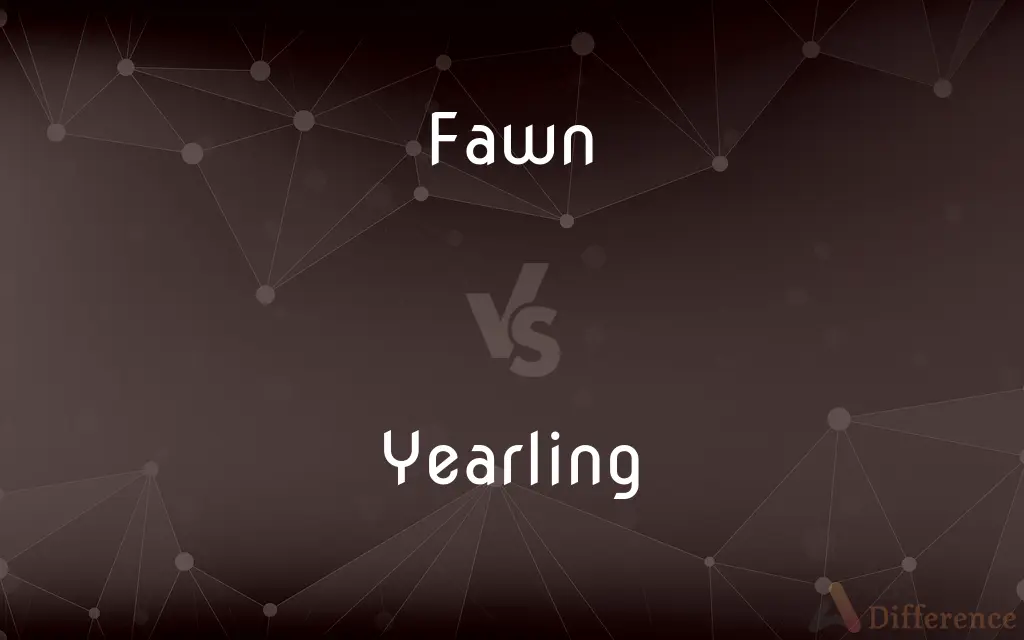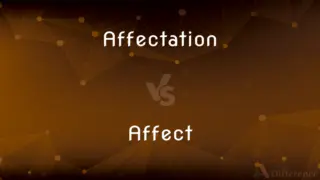Fawn vs. Yearling — What's the Difference?

Difference Between Fawn and Yearling
ADVERTISEMENT
Compare with Definitions
Fawn
A young deer in its first year
A six-month-old roe fawn
Yearling
An animal that is one year old or has not completed its second year.
Fawn
A light brown colour
A fawn dress
Soft shades of pale green and fawn
Yearling
A racehorse that is one year old, dating from January 1 of the year in which it was foaled in the Northern Hemisphere, and from July 1 or August 1 in the Southern Hemisphere.
Fawn
(of a deer) produce young
The forest was closed for hunting when the does were fawning
ADVERTISEMENT
Yearling
An animal that is between one and two years old; one that is in its second year (but not yet two full years old).
A yearling lamb
Fawn
(of a person) give a servile display of exaggerated flattery or affection, typically in order to gain favour
Congressmen fawn over the President
Yearling
A racehorse that is considered to be one year old until a subsequent January 1st.
Fawn
To exhibit affection or attempt to please, as a dog does by wagging its tail, whining, or cringing.
Yearling
(US) A sophomore at West Point military academy.
Fawn
To seek favor or attention by flattery and obsequious behavior.
Yearling
An animal one year old, or in the second year of its age; - applied chiefly to cattle, sheep, and horses.
Fawn
A young deer, especially one less than a year old.
Yearling
Being a year old.
Fawn
A grayish yellow-brown to moderate reddish brown.
Yearling
A young child
Fawn
A young deer.
Yearling
A racehorse considered one year old until the second Jan. 1 following its birth
Fawn
A pale brown colour tinted with yellow, like that of a fawn.
Yearling
An animal in its second year
Fawn
(obsolete) The young of an animal; a whelp.
Fawn
(rare) A servile cringe or bow.
Fawn
Base flattery.
Fawn
Of the fawn colour.
Fawn
(intransitive) To give birth to a fawn.
Fawn
(intransitive) To exhibit affection or attempt to please.
Fawn
(intransitive) To seek favour by flattery and obsequious behaviour (with on or upon).
Fawn
To show devotion or submissiveness by wagging its tail, nuzzling, licking, etc.
Fawn
A young deer; a buck or doe of the first year. See Buck.
Fawn
The young of an animal; a whelp.
[The tigress] . . . followeth . . . after her fawns.
Fawn
A fawn color.
Fawn
A servile cringe or bow; mean flattery; sycophancy.
Fawn
Of the color of a fawn; fawn-colored.
Fawn
To bring forth a fawn.
Fawn
To court favor by low cringing, frisking, etc., as a dog; to flatter meanly; - often followed by on or upon.
You showed your teeth like apes, and fawned like hounds.
Thou with trembling fear,Or like a fawning parasite, obeyest.
Courtiers who fawn on a master while they betray him.
Fawn
A color varying around light grayish brown;
She wore a dun raincoat
Fawn
Young deer
Fawn
Show submission or fear
Fawn
Try to gain favor by cringing or flattering;
He is always kowtowing to his boss
Fawn
Have fawns;
Deer fawn
Share Your Discovery

Previous Comparison
Affectation vs. Affect
Next Comparison
Aliquot vs. Allocate













































